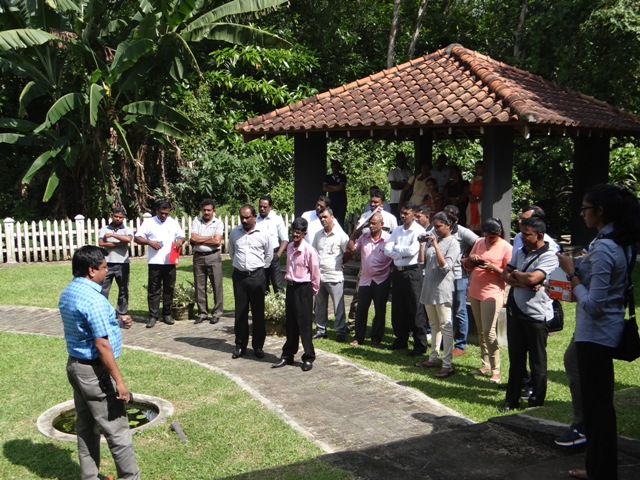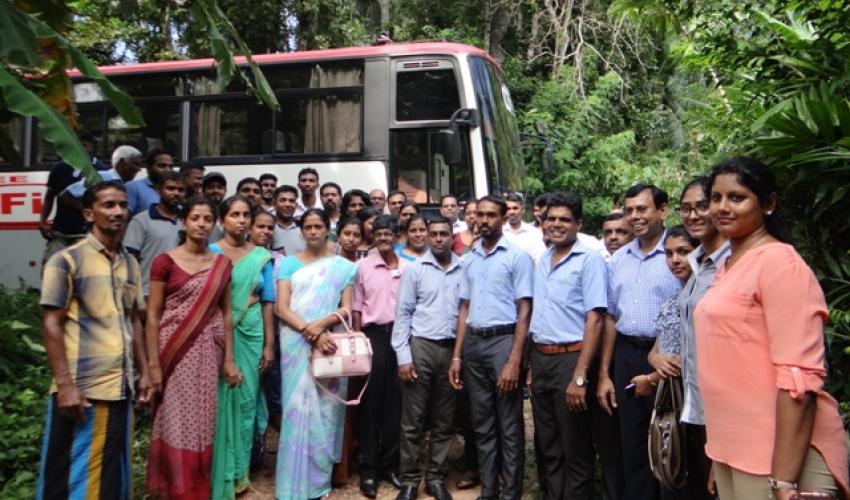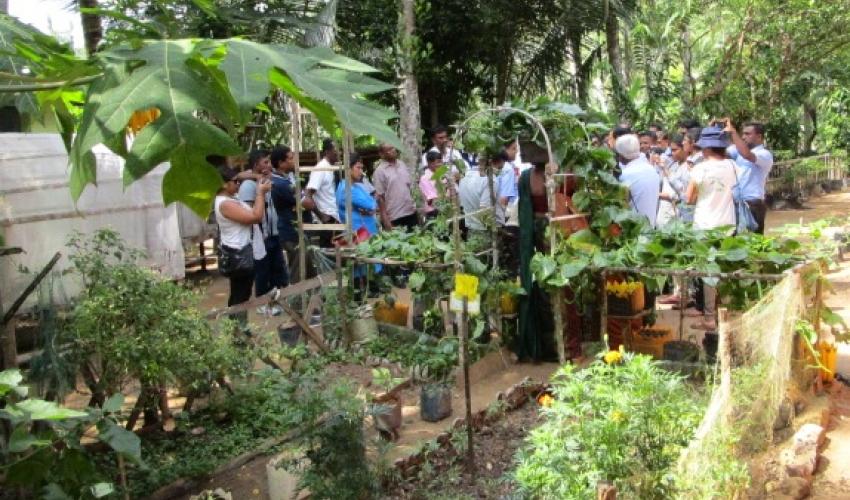A novel approach by KRMP project: Training of trainers- based field exposure
The operationalizing of the Kelani River Multi-Stakeholder Partnership (KRMP), led by IUCN in collaboration with Brandix Limited (www.brandix.lk) took yet another step forward by conducting a training of trainers (TOT) programme for a selected group of volunteers from nine Divisional Secretariats in the Kelani River Basin.

Mr Chathura Weliwita CEO of HELP-O explaining technical aspects of the biogas unit at the Hill Garden Tea Factory
Photo: IUCN Sri Lanka
Based on water quality studies conducted in early 2017, KRMP project identified nine Divisional Secretariat divisions (DSD) in the Kelani River basin (Homagama, Seethawaka, Kaduwela, Kelaniya, Dompe, Wattala, Biyagama and Colombo) as “Management Priority Areas”. In each DSD, volunteers were identified to develop best practices for their areas. As such, the project now has a volunteer force of about 1,000 members.
From this extensive group of volunteers, 45 members representing Development Officers, Grama Niladharis and active community members visited Galle on 16 November 2017 for a Training of Trainers Programme. As a follow-up activity, the group also participated in a workshop at the Hanwella Holiday Resort on 17 November.
 Photo: IUCN Sri Lanka
Photo: IUCN Sri Lanka
During the field visit to Galle, the group visited biogas units at the Hill Garden Tea Factory, MAS Intimates at Galle Export Processing Zone and a domestic biogas plant, which connected to both the waste and sewerage of the house. Mr Chathura Weliwita and his team from HELP-O (an NGO in Galle) assisted in organising the visits to the biogas plants and took an active role in providing information and guidance.
The team also visited two community operated home gardens in Galle that were established with the support of Ceylon Tobacco Company under their Sustainable Agriculture Development Programme (SADP) and a recycling centre—glass collection and an export centre—run by HELP-O, linked to the Galle Municipal Council.
Through this programme, the participants learnt about waste and sewerage management mechanisms, household level composting and home gardening using their own compost and animal manure and traditional methods used by the community to control pests and plant diseases.
 Photo: IUCN Sri Lanka
Photo: IUCN Sri Lanka
The second day of the Training of Trainers session in Hanwella commenced with a presentation on the Kelani River Multi-Stakeholder approach by Dr Ananda Mallawatantri, Country Representative of IUCN. This was followed by a session by Ms Thamara Dissanayake, Assistant Director of the Education and Awareness Unit of the Central Environmental Authority on how to link their ongoing Environmental Pioneer Brigade programme offered for school children and its’ activities to KRMP and the role of Divisional Secretaries.
The rest of the day’s proceedings included a presentation by Mr Kaushal Rajapaksha, Chief Executive Officer of Kalhari Group on plastic recycling industry in Sri Lanka and a pioneer in the process. He explained how a community can initiate a plastic collection center, sorting methods and how to find a proper buyer for the collected plastics and their market. Professor P. K. S. Mahanama, Dean, Faculty of Architecture of the University of Moratuwa explained the storm water management and landscaping technologies.
Facilitated by Dr Ananda Mallawatantri and Ms Dinithi Samarathunga, the final session discussed the divisional level action planning process which is an important component to absorb the best practices learnt during the two days. This opportunity also served as a platform for volunteers to obtain ‘on the field experience’ and see methods of implementing possible solutions for the issues that were identified through initial workshops conducted in the past few months.
